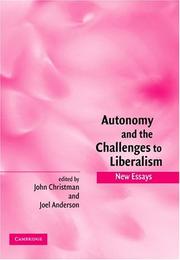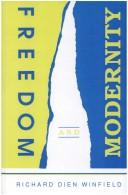| Listing 1 - 10 of 39 | << page >> |
Sort by
|
Book
Year: 2021 Publisher: Berlin : Duncker & Humblot,
Abstract | Keywords | Export | Availability | Bookmark
 Loading...
Loading...Choose an application
- Reference Manager
- EndNote
- RefWorks (Direct export to RefWorks)
Ziel des Buches ist es, die Grenzen zwischen Kunst und Wissenschaft zu durchbrechen, indem das Kernstück der rechtsphilosophischen Abhandlung über die Aktualität der Marxschen Rechtskritik in der Form einer modernen Tragödie dargestellt wird. Der dramatische Text, der den tragischen Fall des sowjetischen Rechtstheoretikers Jewgenij B. Paschukanis verhandelt, wird durch Vorbemerkungen und weiterführende Reflexionen in Anlehnung an das dialektische Theaterverständnis von Bertolt Brecht komplementiert. Gemeinsam bilden Stück und Reflexionen eine neuartige Form der wissenschaftlich-künstlerischen Darstellung, die einen Beitrag zur Demokratisierung von (Rechts-)Kritik leisten soll und sich gleichzeitig als eine Aktualisierung des epischen Theaters im 21. Jahrhundert versteht. Das Buch ist damit eine radikale Umsetzung der Ideen der ›Recht und Literatur‹-Bewegung, indem es die Verbindung von Kunst und Wissenschaft innerhalb desselben Textes praktisch herstellt.The book breaks down the boundaries between art and science by presenting the materialistic critique of law in the tradition of Karl Marx partly in the form of a modern tragedy. The dramatic text about the plight of Soviet legal theorist Evgeny B. Pashukanis is complemented by further reflections on the role that the critique of law plays in modern society. Together, play and reflections form a new way of scientific-artistic presentation, actualizing Brecht's epic theatre in the 21st century.
Book
ISBN: 1441168419 1441165010 1472547934 1441163077 9781441163073 9781441152312 1441152318 9781441165015 9781472547934 9781441168412 Year: 2013 Publisher: New York : Bloomsbury Publishing Plc,
Abstract | Keywords | Export | Availability | Bookmark
 Loading...
Loading...Choose an application
- Reference Manager
- EndNote
- RefWorks (Direct export to RefWorks)
"Philosophers have various reasons to be interested in individual autonomy. Individual self-rule is widely recognized to be important. But what, exactly, is autonomy? In what ways is it important? And just how important is it? This book introduces contemporary philosophical thought about the nature and significance of individual self-rule. Andrew Sneddon divides self-rule into autonomy of choice and autonomy of persons. Unlike most philosophical treatments of autonomy, Sneddon addresses empirical study of the psychology of action. The significance of autonomy is displayed in connection with such issues as paternalism, political liberalism, advertising and physician-assisted suicide. Sneddon both introduces the themes of contemporary autonomy studies and defends a novel account of its nature and significance. Autonomy is an ideal introduction for advanced-level undergraduate and postgraduate students to the issues and debates surrounding individual self-rule."--Bloomsbury Publishing.
Book
ISBN: 1474419704 Year: 2019 Publisher: Edinburgh : Edinburgh University Press,
Abstract | Keywords | Export | Availability | Bookmark
 Loading...
Loading...Choose an application
- Reference Manager
- EndNote
- RefWorks (Direct export to RefWorks)
Integrates Spinoza’s thought into the contemporary debate on interpersonal relationships and individual autonomy13 new essays explore Spinoza’s relational account of autonomy and individualityIntegrates different philosophical approaches and styles, both from analytic and continental traditionsBridges the gap between history of philosophy and contemporary debatesContributes to debates across a number of fields, including Spinoza studies, contemporary political philosophy and ethics, feminist philosophy, and the philosophy of actionThe question of how to understand autonomy has emerged as a critical issue in contemporary political philosophy. Feminists and others argue that autonomy cannot be adequately conceived without taking into consideration the ways in which it is shaped by our relationships with others. This collection of 13 new essays shows what Baruch Spinoza can add to our understanding of the relational nature of autonomy. By offering a relational understanding of the nature of individuals centred on the role played by emotions, Spinoza offers not only historical roots for contemporary debates but also broadens the current discussion. At the same time, reading Spinoza as a theorist of relational autonomy underscores the consistency of his overall metaphysical, ethical and political project, which has been clouded by the standard rationalist interpretation of his works.ContributorsAurelia Armstrong, University of QueenslandKeith Green, East Tennessee State UniversityMatthew Kisner, University of South CarolinaMartin Lenz, University of GroningenCatriona Mackenzie, Macquarie UniversityHeidi M. Ravven, Hamilton CollegeUrsula Renz, Alpen-Adria-University-KlagenfurtAndrea Sangiacomo, University of GroningenJustin Steinberg, CUNYEricka Tucker, Marquette UniversityCaroline Williams, Queen Mary University of London
Book
ISBN: 8884536367 8884536359 Year: 2007 Publisher: Firenze : Firenze University Press,
Abstract | Keywords | Export | Availability | Bookmark
 Loading...
Loading...Choose an application
- Reference Manager
- EndNote
- RefWorks (Direct export to RefWorks)
Autonomy is the core of a lively debate on moral and political philosophy, where many competing perspectives and conceptual distinctions are presented. Several authors tend to override the metaphysical questions of determinism and free will: this is the right step for emphasizing the dimensions of individual choice as well as the role of socialization in developing capacities for critical reflection. In this context, the most important distinction is between "moral" autonomy and "personal" autonomy. Generally speaking, the theorists of personal autonomy try to give an account of autonomy that is conceived not only as moral agency. This move allows the consideration of several patterns of practical reasoning that imply several kinds of reasons for acting. The argumentation considers the discussion between "procedural" and "substantive" theories. Procedural theories emphasize the structural conditions of the process of "identification" with one's own motives. Even if these conditions are relevant, substantive theories rightly point to the role of the content of our reasons for autonomous agency. This perspective requires substantive standards according to which we can recognize and criticize oppressive norms. The main theoretical proposal of this work is to show the normative requirements for autonomy. An intersubjective model is promising if we consider socialization from the point of view of the process through which we develop the cognitive and moral capacities necessary for autonomy. The "scorekeeping" model, (an original variant of Wittgenstein's linguistic game as proposed by Robert Brandom) seems to offer the deontic structure of discursive practices in which the agents have the possibility of discussing and criticizing their own and others' reasons.
Autonomy (Philosophy). --- Philosophy --- Filosofia --- Sociologia --- Politica
Book
ISBN: 1782250204 1472566254 1782250190 9781782250197 9781849463461 1849463468 9781782250203 9781472566256 Year: 2012 Publisher: Oxford, United Kingdom Portland, Oregon
Abstract | Keywords | Export | Availability | Bookmark
 Loading...
Loading...Choose an application
- Reference Manager
- EndNote
- RefWorks (Direct export to RefWorks)
"Autonomy is the central idea of modern practical philosophy. Understood as self-legislation, autonomy seems to require that the validity of norms depends on recognition, namely, that their addressees, being autonomous agents, recognise these norms to be valid. But how can one be bound by norms whose validity depends on their being recognised as valid by their addressees? The questions of how autonomous morality and, on this basis, the authoritative character of law can be understood, present persistent puzzles that have been widely discussed, but still await a satisfactory solution. This book presents an analysis of the idea of autonomy as self-legislation and its consequences for law and morality. It links the idea of autonomy with the idea of the balancing of normative arguments, develops a notion of normative arguments as distinct from normative judgements and statements and explains claims to correctness and objectivity that are found in normative discourse. Thus, a 'logic of autonomy' emerges, and it is pervasive in normative reasoning. It connects theses regarding the logic of norms, the structure of balancing, human and fundamental rights, legal validity, legal interpretation, and the relations among legal systems, offering a theory of central elements of normative argumentation, a theory that is undergirded by the mutual relations that exist between and among its parts as well as through the relations that it bears to other theories. Moreover, it offers an alternative to Kantian notions of autonomy and provides solutions to problems that other theories have failed to master."--Bloomsbury Publishing.
Autonomy (Philosophy) --- Philosophy --- Law (Philosophical concept) --- Law (Philosophy) --- E-books --- Law --- Autonomy (Philosophy). --- Philosophy.
Book
ISBN: 0804775109 9780804775106 9780804770194 9780804770200 0804770190 0804770204 Year: 2010 Publisher: Palo Alto : Stanford University Press,
Abstract | Keywords | Export | Availability | Bookmark
 Loading...
Loading...Choose an application
- Reference Manager
- EndNote
- RefWorks (Direct export to RefWorks)
Transcendence offers an original theory of self and society that reconciles philosophical and political commitments to self-determination, cultural pluralism, and cosmopolitanism.
Autonomy (Philosophy). --- Self (Philosophy). --- Transcendence (Philosophy). --- Autonomy (Philosophy) --- Self (Philosophy) --- Cosmopolitanism --- Transcendence (Philosophy) --- Philosophy, Modern --- Philosophy

ISBN: 9780521120319 9780521839518 9780511610325 0511109806 9780511109805 0521839513 0511610327 1280422076 9781280422072 0521120314 110713997X 0511171617 0511197373 0511298714 0511109490 Year: 2005 Publisher: Cambridge : Cambridge University Press,
Abstract | Keywords | Export | Availability | Bookmark
 Loading...
Loading...Choose an application
- Reference Manager
- EndNote
- RefWorks (Direct export to RefWorks)
In recent years the concepts of individual autonomy and political liberalism have been the subjects of intense debate, but these discussions have occurred largely within separate academic disciplines. Autonomy and the Challenges to Liberalism contains essays devoted to foundational questions regarding both the notion of the autonomous self and the nature and justification of liberalism. Written by leading figures in moral, legal and political theory, the volume covers inter alia the following topics: the nature of the self and its relation to autonomy, the social dimensions of autonomy and the political dynamics of respect and recognition, and the concept of autonomy underlying the principles of liberalism.
Liberalism --- Autonomy (Philosophy) --- Liberal egalitarianism --- Liberty --- Political science --- Social sciences --- Philosophy --- Liberalism. --- Autonomy (Philosophy). --- Arts and Humanities

ISBN: 0585091315 9780585091310 0791408094 0791408108 1438424213 Year: 1991 Publisher: Albany State University of New York Press
Abstract | Keywords | Export | Availability | Bookmark
 Loading...
Loading...Choose an application
- Reference Manager
- EndNote
- RefWorks (Direct export to RefWorks)
Reason. --- Act (Philosophy) --- Autonomy (Philosophy) --- Philosophy --- Action (Philosophy) --- Agent (Philosophy) --- Mind --- Intellect --- Rationalism --- Act (Philosophy). --- Autonomy (Philosophy).

ISBN: 058507691X 9780585076911 9780791412091 0791412091 9780791412107 0791412105 0791412091 0791412105 9781438403175 Year: 1992
Abstract | Keywords | Export | Availability | Bookmark
 Loading...
Loading...Choose an application
- Reference Manager
- EndNote
- RefWorks (Direct export to RefWorks)
This volume brings together leading philosophers of Judaism on the issue of autonomy in the Jewish tradition. Addressing themselves to the relationship of the individual Jew to the Jewish community and to the world at large, some selections are systematic in scope, while others are more historically focused. The authors address issues ranging from the earliest expressions of individual human fulfillment in the Bible and medieval Jewish discussions of the human good to modern discussions of the necessity for the Jew to maintain both a Jewish sensibility as well as an active engagement in the modern pluralistic state. Contributors include Eugene Borowitz, Elliot N. Dorff, Daniel H. Frank, Robert Gibbs, Lenn E. Goodman, Ze'ev Levy, Kenneth Seeskin, and Martin D. Yaffe.
Autonomy (Philosophy) --- Jewish philosophy --- Judaism --- Autonomie (Philosophie) --- Philosophie juive --- Judaïsme --- Congresses --- Congrès --- Histoire --- PHILOSOPHY --- Jewish Philosophy --- Philosophy --- Religion --- Autonomy (philosophy)
Book
ISBN: 0804773769 9780804768757 0804768757 9780804768764 0804768765 9780804773768 Year: 2010 Publisher: Stanford, Calif. Stanford University Press
Abstract | Keywords | Export | Availability | Bookmark
 Loading...
Loading...Choose an application
- Reference Manager
- EndNote
- RefWorks (Direct export to RefWorks)
In this path-breaking new work, Gregory Jusdanis asks why literature matters. Why are we afraid to admit our pleasures of reading, to defend the arts to the school board, to discuss the importance of literature in life? Drawing on a wealth of references from Aristophanes to Eudora Welty, from Fernando Pessoa to Orhan Pamuk, from Cavafy to hypertext stories, Jusdanis reminds us that the arts have always been under attack. Instead of despair, however, he offers a pragmatic defense of literature, arguing that it performs a social function in dramatizing the break between illusion and reality, life and the life-like, permanence and metamorphosis. The ability to distinguish between the actual and the imaginary is essential to human beings. Our capacity to imagine something new, to project ourselves into the mind of another person, and to fight for a new world is based on this distinction. Literature allows us to imagine alternate possibilities of human relationships and political institutions, even in the watery world of the Internet. At once daring and lucid, Fiction Agonistes considers the place of art today with passion and optimism.
Autonomy (Philosophy) in literature. --- Literature --- Literature and philosophy --- Philosophy and literature --- Aesthetics --- Aesthetics. --- Philosophy. --- Theory
| Listing 1 - 10 of 39 | << page >> |
Sort by
|

 Search
Search Feedback
Feedback About
About Help
Help News
News